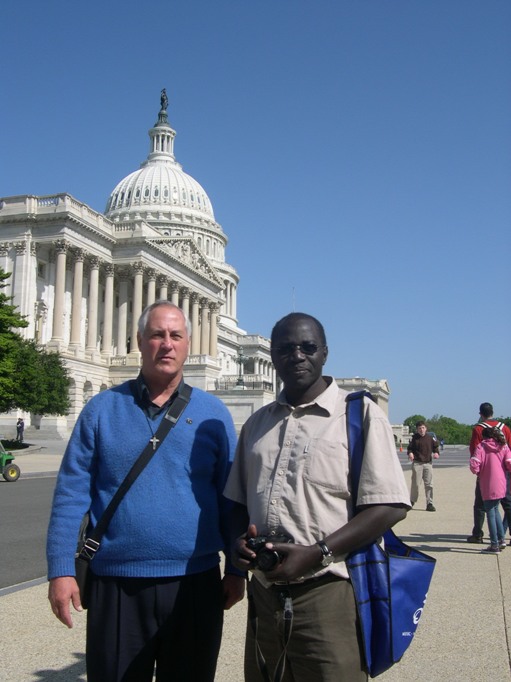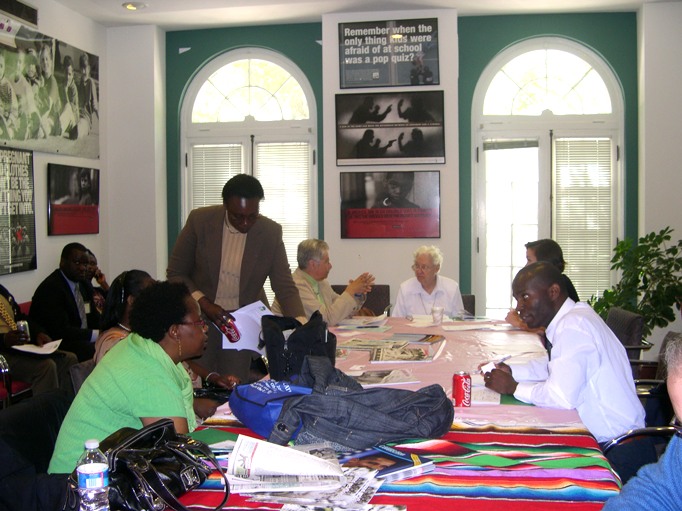From April 17-19th, 2010 Africa Faith and Justice Network (AFJN) held its annual conference in Washington DC under the theme “Justice In Africa: On Whose Terms?” On Monday the 19th, conference attendees walked US Congress’ corridors asking legislators two things: first, to take action in support of free and fair elections in Africa beginning with Rwanda and second, to support and co-sponsor the International Violence Against Women Act (H.R 4594, S.2982). This lobby effort was a success because of the number of people who took part in it, the number of offices they visited, the positive reception, and the timeliness and relevance of our message.
 End Violence Against Women Worldwide
End Violence Against Women Worldwide
Concerning the International Violence against Women Act, we thanked those who already co-sponsored the bill for their leadership. Some of those who have not yet co-sponsored the bill expressed their support for the overall project, and others we urged to consider working on any amendments as appropriate instead of delaying once again this empowering and lifesaving project for women worldwide. Critics of this bill argued that they are concerned about the financial burden that it puts on American tax payers. We believe that where there is a will, there is a way and therefore Congress still can find a way to get this bill passed in a responsible manner. Overall, the support seemed bi-partisan, but it is not clear how quickly this bill will move. Your voice still is important to get this bill passed. Please learn more about the bill and call your representative and ask them to cosponsor the bill if they have not done so.
Elections in Rwanda
Regarding elections in Rwanda, our message was well received. In general, there is a desire to support legislation or a sign-on letter aiming to promote a democratic, peaceful and free Rwanda. AFJN is committed to following up with members of Congress who sit on foreign relations and appropriation committees and Africa subcommittee to encourage them to lead the way in addressing this issue.
As a result of our conversation with some Congressional staffers, we can claim with certainty that many in Congress still view Rwanda as a country recovering from the 1994 genocide whose leadership is acting to restore order with a focus on the victims. Many of our interlocutors on Capitol Hill described Rwanda uncritically as a “success story” in Africa as far as democracy, economic and business reform is concerned. In addition, Rwanda’s business reform has attracted US investors, which grants insight into the unbalanced US policies toward Rwanda. The staffer for Congresswoman Sheila Jackson of Texas told us that she cannot criticize the Rwandan president because of information technology (IT) business deals they have with Rwanda.
 That US foreign policy approach in Rwanda is focused on profit at the expense of democracy, human rights and protection of people’s lives is very concerning. Recently Senator Russ Feingold shone some light to this issue as part of a statement on elections in Rwanda: “[W]e fail to be true friends to the Rwandan people if we do not stand with them in the fight against renewed abuse of civil and political rights. In the next few months in the run-up to the elections, it is a key time for international donors to raise these issues with Kigali.” Part of our advocacy for lasting peace, democracy and rule of law in Rwandan is to get Congress and the American people to review their general perception of Rwanda in the light of the genocide and what is going on today. (see NYTimes’ coverage of the arrest of primary opposition leader Victoire Ingabire here)
That US foreign policy approach in Rwanda is focused on profit at the expense of democracy, human rights and protection of people’s lives is very concerning. Recently Senator Russ Feingold shone some light to this issue as part of a statement on elections in Rwanda: “[W]e fail to be true friends to the Rwandan people if we do not stand with them in the fight against renewed abuse of civil and political rights. In the next few months in the run-up to the elections, it is a key time for international donors to raise these issues with Kigali.” Part of our advocacy for lasting peace, democracy and rule of law in Rwandan is to get Congress and the American people to review their general perception of Rwanda in the light of the genocide and what is going on today. (see NYTimes’ coverage of the arrest of primary opposition leader Victoire Ingabire here)
Washington’s lack of political will to reevaluate the socio-political situation of Rwanda translates in a resistance to make the needed and overdue push to hold President Paul Kagame’s regime accountable on principles of democracy, good governance, human rights and rule of law. The US guilt for not acting to prevent the genocide explains in part US leadership’s tolerance of Rwanda’s regime undemocratic behavior. Also, the US fears creating tension similar to what France and Spain had to deal with when they challenged Rwandan current leadership and some of its top military officers on serious human rights violations and crimes against humanity before, during and after the war that led to the genocide. A USAID-funded research exposed the truth about Rwanda, but US government acting according to the finding and recommendations is yet to happen.
American tax-payers need answers to why their leaders continues to financially support heavy handed regimes in Africa of which President Paul Kagame is the latest on a long list. It is misleading for the US to claim to want Rwandans reconciled and healed from the genocide while supporting a regime that disregards making such a goal possible and attractive to the majority of its population.
Africa Faith and Justice Network urges you to call your representatives and ask them to prevent another genocide in Rwanda starting by calling for free and fair elections in August. In addition, ask them to pass the International Violence Against Women Act, a bill that will give the US tools to, among many things, assist, protect and empower women in these countries where women and girls endure violence day in and day out.
